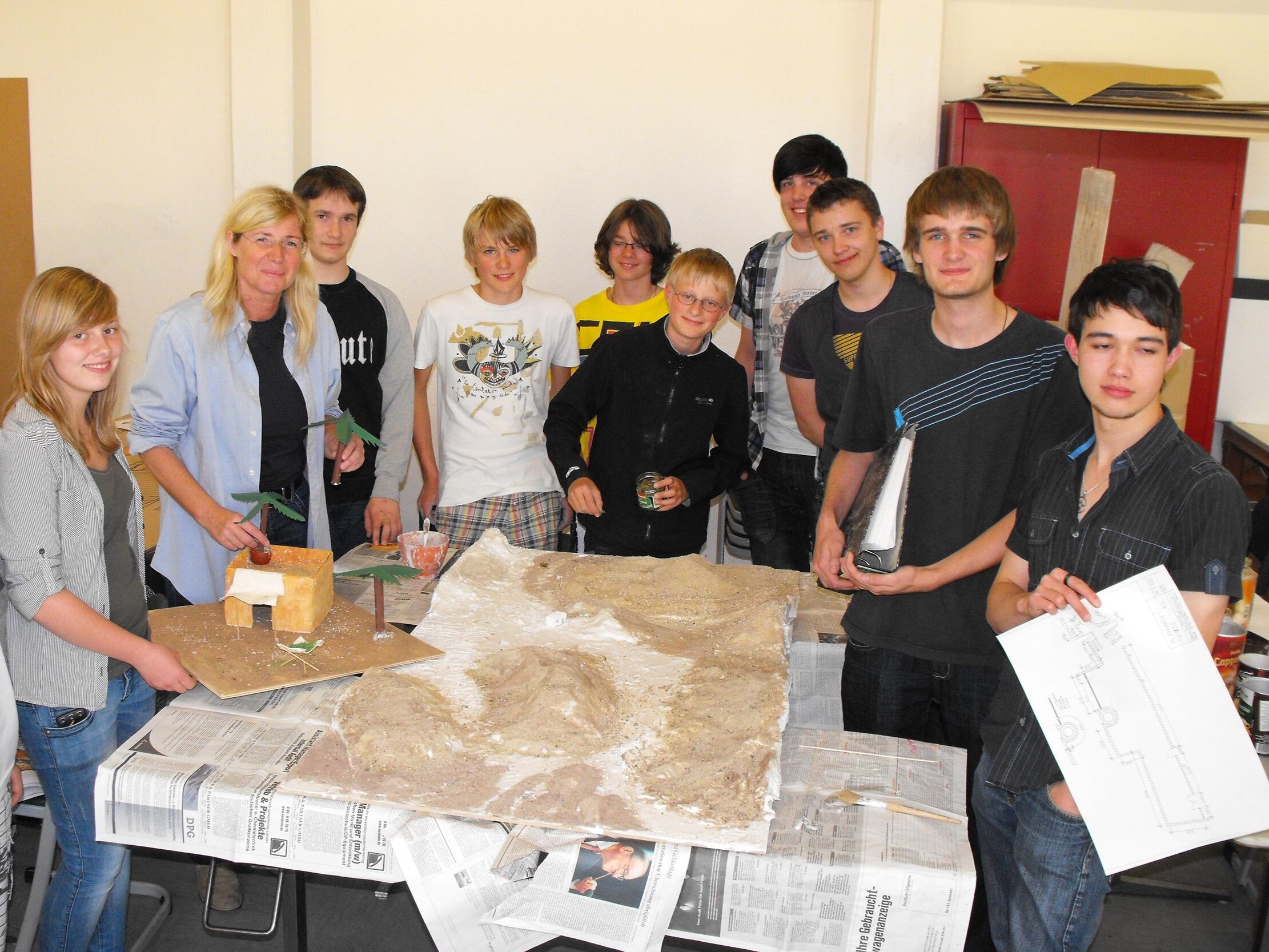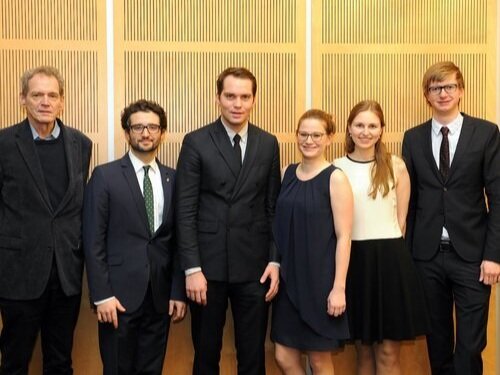Obermayer Award
“Truth makes you strong.”
Dr. Marion Lilienthal seeks to tell the real story, through extensive research and a hands-on approach to teaching history
Dr. Marion Lilienthal has always taken the road less traveled. As a young schoolgirl in Kassel, at an age when most of her classmates were content to play with dolls, she became interested in the Nazi era. Her grandparents, who opposed the Nazi Party and suffered disadvantages as a result, raised her father to be politically active and to speak up against injustice. He, in turn, raised his daughter to embrace the same values.
Although her father was a child during the war, he remembered seeing Jews led through Kassel, probably to the train for deportation. He also spoke warmly of a Jewish family he had known, always with enormous respect but also sadness about their suspected fate. That left his young daughter with a desire to find out what might have happened to them. It made the fate of Jews personal for her, to give a name and a life story to each.
As a teenager, she created an exhibit about Jews in the city of Kassel. As a result, she became acquainted with Esther Hass, a teacher who was then head of the Jewish community in the city. Hass took the girl under her wing, and the two worked on many projects together, including one at the local Jewish cemetery.
At the time, Dr. Lilienthal tried to learn as much as she could about the history of Nazi Germany, but she repeatedly ran into roadblocks. “As a young person, it was very difficult to get information. There was public opposition. The archives did not answer all my questions, and people looked at you strangely when you researched there,” she recalls.
Twenty years later, in 1999, she arrived in Korbach as a high school teacher with a specialization in history. Since then, not only has Dr. Lilienthal distinguished herself among colleagues and students by her commitment to teaching; she has also engaged in exceptional socio-political activities with her students, young adults, and community members. Her goal is to bring the centuries-old history of the Jews in the region back into the collective consciousness so that people can learn from mistakes of the past as they confront prejudice and anti-Semitism today.
Dr. Lilienthal’s impact, however, extends beyond teaching and spearheading group activities. Her work one-on-one reconnecting former Korbach residents and their descendants with the region has profoundly changed individual hearts and minds in a way that brings peace and closure. “I was able to learn about my grandparents and great-grandparents, who I could never meet, and the events that led up to my mom coming to America. The love shown to my daughter when she was invited to Korbach by Dr. Lilienthal to experience the places where my mom must have spent time is priceless,” says Renee Giordano of New York City. “While I have never met Dr. Lilienthal personally, she has impacted my life greatly.”
Dr. Lillienthal says, “The Nazis wanted to destroy all Jewish life. I try to research these individual Jewish life stories to keep their memory alive.” It has not always been easy. She depends on post-war period files and interviews with local people. “I have looked for photos, gone from house to house knocking,” she says. Recently, a woman contacted her with eyewitness testimony about the fate of two Korbach brothers her father saw in Treblinkla. “She is so emotionally burdened. She wants me to help,” Dr. Lilienthal says.
Part of Dr. Lilienthal’s motivation is a mission to correct inaccuracies she found in history books.
Today, she leads guided tours of Korbach that focus on the pre-World War II Jewish community. She invites people to walk in the footsteps of Jewish inhabitants, standing in front of a house and showing them an archival photo. She tells them what she knows about the family that used to live there and its fate. “The next time they pass this house, they have an idea of what happened there,” she says.
Forging Connections
She first began her research 20 years ago as a newcomer in Korbach. “If people don’t know you, they don’t necessarily want to speak to you,” she says. Also, there was no interest at that time in revisiting the Nazi period. “You had to be tough, be determined, and be strong. I have received not only praise but also hostility.”
When she mounted an exhibit about the looting of the Jews in Korbach, the mayor and city council supported her, but many Korbach residents did not. “The population is always afraid that a shadow could come over the family. Even today, there are critical letters and statements,” she says.
A few years ago, Dr. Lilienthal received her doctorate in “Euthanasia.” Her dissertation focused on Nazi-era persecution of sick, disabled, and “socially unadjusted” people from Korbach.
Her activities—nearly all of which have been outside her regular paid work—include: remembrance projects and publications to raise awareness of Jewish history in the region; connections to Jewish descendants from the region; a range of activities and workshops with her students and youth groups that have had a significant impact on how they see local history and the world; network building locally with like-minded people; and work with anti-racism, democracy, and tolerance groups and initiatives.
She and many colleagues, including several former Obermayer Award recipients, have formed a network of people and associations from cities and towns in the district where there used to be vibrant Jewish communities. The network sponsors events and publications that spotlight persecution and murder of the Jews while promoting coexistence of Jews and Christians in the region.
Her books and articles, which are used by libraries, history associations, and other institutions, have been influential in combatting prejudice, as have her special public exhibitions. “Over the years, her many publications have helped people of all ages overcome the period of forgetting, repressing, and denying essential parts of our regional history. She has made a great contribution to bringing the centuries-old history of the Jews in our region back into consciousness so that people can learn for the future from the mistakes of the past,” reads a statement of support signed by Ernst and Brigitte Klein, Karl-Heinz Stadtler, Hans-Peter Klein, and Johannes Grötecke, all Obermayer award recipients from the region.
But perhaps her most impactful work has been as a teacher, where she carries out projects with her colleagues and students that focus on Jewish life in the region.
Many former students credit Dr. Lilienthal’s hands-on approach to teaching the history of the Holocaust with sensitizing them to fight anti-democratic tendencies. “The work with Dr. Lilienthal left a lasting impact on me,” says former student Dominic Antony, who oversees the technical implementation of her projects. “Many years after my schooling, I am still involved in the fight against anti-Semitism and racism.”
Over the years, her research and documentation of the history of German-Jewish families led her to record, process, and publish the life memories of contemporary witnesses. She established and maintains contact with families who have emigrated to the United States, Israel, and Australia.
Ten years ago, with the help of her students, Dr. Lilienthal created an online portal so this work is accessible worldwide. “I am fearful about the future with no witnesses. I try to work as fast as possible to contact as many witnesses as possible and document what they experienced. I know it is a race against time,” she says.
The website, Gedenkportal Korbach, provides extensive information about Korbach and its Jewish community, Jewish families, perpetrators, and victims. (gedenkportal-korbach.de). Family members who don’t know who to ask about their family history can see her genealogical work in photos and documents, enabling them to reconstruct their own family tree and learn about deportations. The site preserves the history and memory of the Jewish community that lived in Korbach for hundreds of years until the Holocaust.
She was one of the first in the region to recognize the importance of online publications, particularly for the young generation today. Her electronic publications have extended the reach and influence of her work far beyond the region, and made them accessible teaching materials for schools worldwide.
For Michael Dimor of Tel Aviv, Gedenkportal Korbach was the gateway to both learning about his mother’s family roots in Korbach and also developing a deep, strong relationship with Dr. Lilienthal and her husband. He contacted her in 2011, seeking information about his family. She forwarded photos and documents and arranged a visit for Dimor and his family during the 80th memorial of Kristallnacht in 2018. They participated in several ceremonies, prayed in the old Jewish cemetery, and met with Dr. Lilienthal’s students, including Marie Fischer. “For our generation, who never saw that part of history, it is hard to imagine what terrible things happened back then,” Fischer says.
Dr. Lilienthal believes her remembrance work is even more important today. “Truth makes you strong. It is much easier to deal with the truth than with an unspoken supposition. With my pupils, I talk about the structure, the motivations, why people did some things. It takes a lot of energy, but it can only strengthen them,” she says. “With all the tragedy or difficulty you encounter, you will come out stronger.”
— Obermayer Award recipient 2021
THIS WALL BRINGS PEOPLE TOGETHER
Students at this Berlin elementary school, built on the site of a synagogue, have been building a wall for the past two decades. It delivers a powerful message about community.
STUDENTS REACHING STUDENTS
When a handful of ninth graders from Berlin met Rolf Joseph in 2003, they were inspired by his harrowing tales of surviving the Holocaust. So inspired that they wrote a popular book about his life. Today the Joseph Group helps students educate each other on Jewish history.
“I SPEAK FOR THOSE WHO CANNOT SPEAK”
Margot Friedländer’s autobiography details her struggles as a Jew hiding in Berlin during World War II. Now 96, she speaks powerfully about the events that shaped her life and their relevance today.





